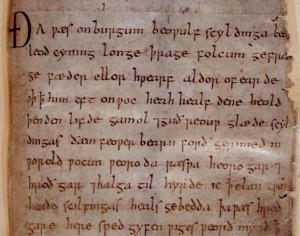We were pleased to welcome Graeme Bird (Gordon College) who joined us for a discussion exploring the Old English poem Beowulf, which is also our next Book Club selection.
Handouts:
- Handout of focus passages that were featured in the discussion (updated with line numbers for those using different editions):
Selection of focus passages for Beowulf-with line numbers (PDF) - Handout of the first 11 lines in the original Old English:
Beowulf 1-11 (PDF)
To view the recording, you can watch on our YouTube channel or in the frame below:
Mentioned in the discussion:
- Beowulf edited by Bruce Mitchell and Fred C. Robinson
- Calvert Watkins: How to Kill a Dragon
- Gawain and the Green Knight: poem in Middle English. Various editions and translations available.
During the discussion, Graeme Bird’s interest in Homeric poetry and jazz piano were mentioned, as were the number of manuscripts and manuscript fragments for Iliad. Here is the link to a video discussion recorded in 2014 on the subject of Homeric poetry, multitextuality, and jazz.
For further videos please visit the Watch page.
Graeme D. Bird
Dr. Bird is a native of New Zealand and Associate Professor of Linguistics and Classics at Gordon College. He is also a participant in the Harvard-affiliated Homer Multitext Project and Lecturer in Extension at Harvard’s Division of Continuing Education, where he currently teaches courses on Mathematics and the Greeks and Quantitative Reasoning: Practical Math. His teaching and research interests include Greek and Latin language and literature, Indo-European linguistics, and early English literature. He is the author of Multitextuality in the Homeric Iliad: The Witness of the Ptolemaic Papyri and “Critical Signs—Drawing Attention to ‘Special’ Lines of Homer’s Iliad in the Manuscript Venetus A” in Recapturing a Homeric Legacy: Images and Insights from the Venetus A Manuscript of the Iliad (3.5 MB PDF download). He enjoys exploring the connections between such diverse disciplines as Homeric poetry, historical linguistics, Greek mathematics, computer programming, and jazz improvisation.
Image credit
 Part of folio 132, Beowulf manuscript, Cotton MS Vitellius A.XV, British Library, Public Domain
Part of folio 132, Beowulf manuscript, Cotton MS Vitellius A.XV, British Library, Public Domain